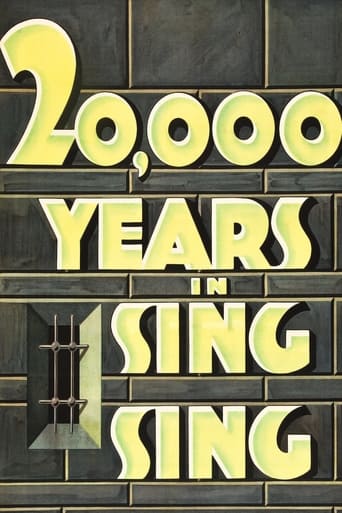

The very same year that Barbara Stanwyck went up the river in "Ladies They Talk About", Spencer Tracy took the Metro North up to Sing Sing. He's guilty of many heinous crimes, and has a 5-30 year stretch for a robbery charge with assault and battery. But if Tracy has his way, his "visit" to Sing Sing will have him whistling a happy tune. He doesn't count on warden Arthur Byron stepping on his toes, turning down his crooked attorney's (Louis Calhern) request for special treatment. After months of confinement in his cell (having been told he'd be longing for the rock pile), Tracy gets out, grabs his sledge hammer, and is happy to finally see the light of day. Eventually, his better behavior lands him a job working in the shoe department.When Calhern begins to put the moves in on Tracy's gal (a young Bette Davis), Tracy plots his breakout, but of course, it happens on Saturday, which he considers his "unlucky" day. The warden, trusting Tracy, gives him a temporary leave when he learns that Davis has been in a car accident and will probably not survive. Tracy intends to return (even if facing execution), but is involved in a murder, and the warden faces the wrath of the press and considers resigning his job.This prison drama doesn't totally sugarcoat conditions in the penal system, but something tells me that even in Pre-Code Hollywood, there was more going on at Sing Sing than what is presented here. An honest warden, strict but essentially kindly guards, and the privilege of temporary leaves made me a bit cynical. Still, when you've got an actor like Tracy, a rising star like Davis, some sizzling dialog, and tight direction by Michael Curtiz, the result is a cracking crime drama that made Warner Brothers movies the most realistic and gritty before that nasty production code come along and took the sass out of their sails.
... View MoreThis is a story about good-hearted crook Tommy Connors (Spencer Tracy), the warden of the prison he's in (Arthur Byron) and his girlfriend Fay Wilson (Bette Davis) in that order of importance. The warden agenda of order and fair treatment initially brings him in conflict with Tommy, but after Tommy realizes there is no other way, they get along much better. Warden even lets him to visit Fay in distress, which has fatal consequences.The whole film is an ambitious attempt to describe situation in prisons, relations between inmates and the system and between inmates and beloved ones outside the prison. It indeed gives us insight into this issues, however the story lacks coherence. Because of poor screenplay and uninventive direction we are just jumping between different scenes. Furthermore, even after I watched corresponding scenes several times, I still do not get what exactly happened to Fay and what was her real medical state.The only character that displays considerable inner feelings is well described by Spencer Tracy's fine acting. But I miss more depth from other two main characters. Bette Davis is pale portraying Fay, which is - to my amazement - presented as a refined girl. Despite Bette Davis does know how to make something even from seemingly minor characters, like the character of Arlene in largely underestimated film Fog over Frisco (1934), there is simply nothing seriously to act. Fortunately, she fought hard for better roles and showed us her abilities in later films. The rest of the crew is easily recognized as a standard reliable Warner Bros troupe which almost invisibly slips from one film to another.It is worth watching Spencer Tracy in his early acting role (not so for Bette Davis) and for the objective review of prison life in 1930s. Even if this does not seems much, I think a good film lover should see it for a record.
... View MoreIt's unfortunate that the one and only teaming of Spencer Tracy and Bette Davis was early in their careers when neither really had a chance to show what they were capable of.Tracy was under contract to Fox at this time and Fox loaned him to Warner Brothers and at that time Tracy was playing all kinds of mug parts. Here he does a role that James Cagney must have turned down over at Warner Brothers.Tracy is a gangster who's freshly arrived at Sing Sing doing a five to thirty year stretch for some unnamed offense. He's accompanied by Louis Calhern his crooked politician attorney. While Tracy's being processed in, Calhern is upstairs trying to bribe warden Arthur Byron. It doesn't work and Tracy begins life at Sing Sing on the wrong foot.Gradually things warm up between the two of them, Tracy and Byron and Byron gives Tracy a 24 hour furlough from Sing Sing on the honor system. While in New York Tracy and Calhern mix it up, because Calhern's now on the make for Tracy's girlfriend Bette Davis.Now one could argue that this was an example of progressive thinking on the warden's part. Stuff like that just wasn't done back in the day, in fact some "progressive" release policies are what kept Michael Dukakis from becoming president. Not even players of the caliber of Tracy and Davis could make me swallow this one. I will say that Louis Calhern is the best one in the film, he is one sleazebag for the ages.In fact 20,000 Years in Sing Sing only gets as high a rating as it does because of Tracy and Davis. Good thing Davis fought for better roles and Tracy's potential was only really explored after he got to MGM.
... View MoreThis movie is a tame, toothless wannabe prison/crime drama that doesn't hold a candle to its pre-Code siblings such as Scarface, Little Caesar, and Public Enemy, to name a few. I was quite disappointed.The movie starts out promising enough, with Spencer Tracy as a hardened tough guy being hauled off to Sing Sing. The problem with this movie is that is was really all over the map -- it didn't pick one genre and stick to it. At times it was a crime flick (or was pretending to be), at other times a light-hearted comedy, at other times a buddy flick (with the prison warden and Tracy being the buddies, no less!). The actors did well with their individual roles (including a very young and beautiful Bette Davis) and the story moved fairly apace, but in the end it added up to a whole lot of nothing for me.To top it off, there were some inconsistencies and/or hard-to-follow plot developments that bothered me: 1 - During a psychological test session to determine which manual labor to place the prisoners in, Tracy and Lyle Talbot do good enough on their puzzle to earn the "shoe shop" (top of the line job at the prison, according to the story), but dolt Hype can't fit the square piece into the square slot even after 5 minutes, so he is assigned lavatory duty. However, minutes later when we see the boys toiling away in the shoe shop, there's Hype too! 2 - While on his honor leave, Tracy decides he needs to get out of town rather than returning to prison. He talks to one of his buddies to make arrangements to leave on a train, and even hands over $5,000 to help grease the wheels and make the escape happen. Then, a scene or two later, we see Tracy showing back up at prison. What gives? 3 - The whole business with Tracy's lawyer and his girlfriend and the $5,000, I just didn't understand it. The movie tried to explain it but either they did a really bad job of it, or there were things going on in 1932 that you just had to be there to understand it (and hence my 2005 mind didn't quite catch), or I'm as big of a dolt as Hype. (I prefer not to think it's the latter!) Overall, it was fun to watch Tracy and Davis early in their careers, but honestly wasn't really worth having to sit through this movie in order to do so.
... View More